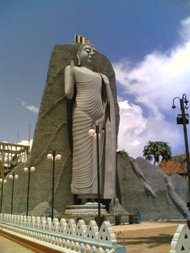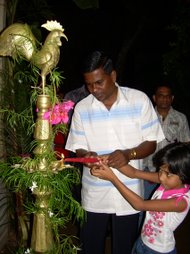Welikada Prison: Where prisoners are also human beings
The world is awaiting the themagula of or Lord Buddha. It is the time of giving and spreading compassion to humanity. In this time of good will, The Nation visited the Welikada Prison to share the spirit of Vesak and to find more of the recent endeavours to enhance the quality of life of the inmates
“By oneself is evil done and by oneself is one sullied. By oneself is evil not done and by
oneself is one purified.” - Dhammapada
By Randima Attygalle
---www.nation.lk
“All prisoners are human beings,” state the placards that adorn the walls of the Welikada Prison. Any one walking through its gates will bear testimony to these words. A busy atmosphere coupled with a festive flavour of the Vesak season enveloped us. The prison inmates were pruning the garden flora, some carrying trays of mid-day tea to officers, whilst others were immersed in Vesak serasili. An impressive mammoth koodu rajaya complemented by an assortment of its miniature koodu awaiting the themagula of Budu piyanang, feasted our eyes. Intricate designs emerging on the pure white surfaces of this magnificent edifice spoke volumes of the creativity of those ‘sheltered’ under the ‘maha ulu gedera’.
Psychological solace
“Each prison in the country has come up with its own Vesak programme for the year. At district level, each such prison will be having its own Vesak programme in collaboration with the local authorities. At Welikada, we have several events lined up including a Sil programme and a Bodhi pooja series to mark the Vesak sathiya (Vesak week,)” explained the Commissioner General of Prisons, Major General Vajira Wijegunawardena, as we discussed the special Vesak programme of the Prison net-work of the country. “Apart from the above events, inmates of the Welikada Prison are also responsible for the Vesak decorations at Gangaramaya and Sambodhi Viharaya, Colombo,” Wijegunawardena added. Shedding light upon the Bodhi pooja series which is a new event of the Vesak agenda of the Welikada Prison, he said, “from time to time we have been having Bodhi poojas for various purposes, but this time starting from 12th of this month, we will be having a series of bodhi poojas till the end of vesak week, commencing daily at 4 o’clock in the evening.” Mental development of the inmates and psychological solace seem to be the prime objective desired through all these spiritual activities according to Wijegunawardena.
Social interaction
‘Bandanagaraya gamata’ (taking the prison to village) is a novel concept fashioned by the present Commissioner General. Its objectives are two-fold: making the prison inmates socially-oriented and their story being a ‘forewarning’ to potential wrong-doers. “If we look at prison statistics, we can clearly see that 80% of the prison population is illiterate. Majority of them have not received the basic education. They are a segment of society with no parental guidance or any religious affiliation, making them more prone to crimes. Therefore with the objective of addressing this grave social issue, the concept Bandanagaraya gamata was initiated where the prisoners will address the civil society,” explained Wijegunawardena.
Essentially a voluntary service, Bandanagaraya gamata is expected to be an island-wide campaign, with its pilot project commencing in Tangalle early next month. “Generally you cannot expose the prisoners. Therefore it is entirely voluntary, the response of which is quite satisfactory,” said Wijegunwardena. He further said, “when society is wronged by a citizen, the law enforcement authorities such as the police and judiciary will intervene and the prison set- up will occupy the third phase of this intervention process. The whole idea behind Bandanagaraya gamata is to revert to the ‘pre-wrong’ phase or to play a preventive or an awareness role because it is the prisoner who will address the civil society and his story will be a ‘forewarning’ to many.”
The target group of this concept are those who are not schooling or attending daham pasel or Sunday school, the grama sevakas and chief priests of respective areas will be acting as mediators in collecting statistics of such groups and summoning them to be addressed.
Creativity
“It is amazing what the prison inmates are capable of. From kottu- makers to mechanics, there is a wide range of resourceful personnel among them,” said Wijegunawardena. According to him, although deprived of a proper education, the majority of the prisoners are highly-skilled in some vocation, and soundly equipped with practical knowledge. “I can illustrate this with a very interesting personal experience. There was this door-alarm which was not functioning properly and all ‘experts’ ruled out it was beyond repair. To my bewilderment, one of the inmates did a marvelous job with it and now it’s in use,” added the Prison Chief with a smile.
National development
“This is a very versatile department, and it is paramount that the talent is utilised in national development rather than stagnating behind the bars,” Wijegunawardena said further. True to his words, a comprehensive project channelling the competency of the prisoners in national development is under way. “The society considers a prisoner as a prisoner forever. He may come here as a prisoner, but he need not necessarily walk out of these doors as a prisoner. There should be an attitude change. This is why I initiated the cultivation project- taking prisoners to cultivate barren paddy fields,” explained Wijegunawardena emphasising on the importance of making the prisoners an integral part of the State economy.
Disaster-management and garbage-management are the other identified areas in this endeavour. “Life is not easy for these inmates once they are released and go back to the mainstream. Very often we see them returning once more. This type of social interaction helps facilitate the process of gradually introducing them back to the mainstream,” said Wijegunawardena.
National policy
Addressing the ‘practical issues’ should be the pivotal role of rehabilitation process according to Wijegunawardena. “Millions are spent on discussions and conferences on rehabilitation. But they would not serve the purpose unless practical solutions such as the change of environment is created,” expressed Wijegunawardena of his concerns. An ‘Industrial City’ with foreign investment, akin to the Free Trade Zone, is a dire need according to him. “There should be a national policy governing this concept as unemployment crisis of those who are released has become an acute social issue, specially where drug addicts are concerned. About 40% of the prison population consists of drug offenders and very often when they are released, they get back to their old vocation and their defense is ‘apita wena monawada karanna thiyenne?’ (what else can we do?) Therefore it is time that remedial measures are taken,” he emphasized..
Rehabilitation
When the bread winner is imprisoned, the family unit disintegrates. This is the bitter truth. Addressing this social reality, a rehabilitation process of ‘those who are left at home’ is operative through Divisional Secretariats. “Statistics of dependents are obtained through Divisional Secretariats and the interests of the spouse such as Samurdhi loans and self-employment schemes are looked after, thereby securing the education of the children as well,” explained Wijegunawardena.
Overcrowding of the prisons poses as a major challenge in the rehabilitation process within the prison set up. “About 92% of the prison population constitutes short-term prisoners and out of them, the majority are those who are remanded which should not be the case. As a result of this overcrowding, our prison system has failed to separate the prisoners according to the offence, in rehabilitating them. Those who are charged with murder and rape mingle with petty offenders, making the rehabilitation process a challenge,” explained Wijegunawardena further.
Counselling
With the intervention of the UNDP, a uniform programme of counselling for the prisoners is underway. “Counselling is a very sensitive area as there is man-to-man interaction. At times, we see hidden agendas behind counselling. This confuses the prison inmates as well. So to assure transparency, we have streamlined the programmes which will be operative through UNDP in near future,” explained Wijegunawardena.
Mother and child
To ensure better living conditions for the off spring of the female inmates of the prison, thereby enhancing their quality of life, a separate ‘home’ is being established in Kalutara. “Presently there are about 45 children in Welikada and the atmosphere prevalent is not conducive for a healthy life. They interact with other inmates and the influence can be quite detrimental. We have already refurbished a building outside Kalutara prison to shelter mothers and children, a project which was quite costly,” explained Wijegunawardena who added that creating the atmosphere of a ‘real home’ and ensuring the child of his education are the prime objectives of this project.
Parental separation is a traumatising experience for any child and for those who will have to bear a ‘social stigma’, it could be worse. All children above five years are separated from the female inmates and handed over either to a guardian or a ‘home’ to ensure their education, the psychological trauma of which could reflect in their adult personalities. “Although this is done in the best interest of the child, separating the child from the mother is a very sensitive task. Sadly we have had no options in this matter. However, there is some ray of hope for them with the ‘special home’ coming up in Kalutara. Suggestions are also put forward to allow the mother and child to live together even after five years, may be till they reach the age of majority,” explained Wijegunawardena further.
Shedding light upon his vision for the betterment of the inmates, the Prison Chief said, “a change of attitude is essential, not only within the civil society but among the prison officials themselves. The world has changed and we too should change accordingly, utilising the man power behind these ‘bars’ for the sustainable development of the country.”
(Pix by Nissanka Wijerathne)





No comments:
Post a Comment